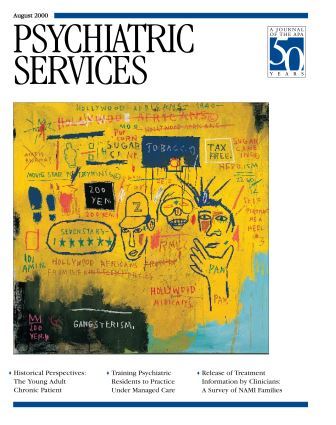To the Editor: Although antidepressants introduced since the late 1980s have won widespread acceptance from physicians and patients, randomized clinical trials have generally shown response rates no better than for older drugs (
1,
2). We examined whether the newer antidepressants offer advantages in clinical practice that are not apparent in randomized trials.
The senior author reviewed the records of all outpatients with a current major depressive episode whom he evaluated and treated with antidepressants in his university-based office during two time periods: July 1980 through December 1987 and January 1992 through December 1996. Patients with borderline, schizotypal, schizoid, or paranoid personality disorder; rapid-cycling bipolar disorder; or a history of nonaffective psychosis were excluded from the study.
Patients were included in the study if they took at least one dose of the prescribed antidepressant. Those who received more than one drug trial were rated according to their best response. An adequate trial was defined as either four weeks of treatment, with one week or more on 200 mg of imipramine per day or the equivalent, or marked or moderate improvement.
Seventy-one patients from the 1980s and 46 patients from the 1990s met inclusion criteria. Ninety percent of the patients (N=105) had a DSM-IV diagnosis of major depressive disorder, and 10 percent (N=12) had a diagnosis of bipolar II disorder or bipolar disorder not otherwise specified. Patients were assigned a numerical score based on their global improvement: 4, marked improvement (full remission); 3, moderate improvement (clear improvement but still significant symptoms); 2, slight improvement; and 1, no improvement.
The 46 patients from the 1990s showed a significantly higher median improvement score than the 71 from the 1980s (median score=3.5 versus 3, p=.026, Mann-Whitney U test; mean±SD score=3.28±.89 versus 2.80±1.13). A significantly higher proportion of the 1990s patients also showed marked or moderate improvement (85 percent, or 39 patients, versus 62 percent, or 44 patients; χ2=7.05, df=1, p=.008). Fifty percent of the 1990s patients (N=23) showed marked improvement, compared with 37 percent of the 1980s patients (N=26), but the difference was not significant.
Ninety-five percent (N=37) of the 39 responders in the 1990s responded to antidepressants not available in 1987. Only 7 percent (N=3) of the 1990s patients failed to receive an adequate antidepressant trial, compared with 31 percent (N=22) of the 1980s patients (χ2=9.94, df=1, p= .002). In both decades the primary reason for an inadequate trial was inability to tolerate side effects.
These results need to be evaluated cautiously for several reasons, including the small sample size, the absence of structured evaluations, the use of unblinded, nonstandard assessments, and the fact that antidepressant switching and the use of psychotherapy and other psychiatric medications were uncontrolled. Our findings cannot be generalized to more severely ill inpatients, who in some studies have been reported to have poorer outcomes with some of the newer antidepressants (
3,
4).
Nevertheless, these naturalistic data raise the possibility that the introduction of newer antidepressants over the past decade may have led to improved outcomes for depressed outpatients in the "real world," at least in part by enabling more individuals to tolerate an adequate trial. The discrepancy between our findings and those of most randomized clinical trials may reflect the many ways in which clinical practice differs from experimental treatment (
5). The fact that even in the 1990s half the patients did not achieve full remission underscores the need for further improvement in our pharmacotherapy for depression.

